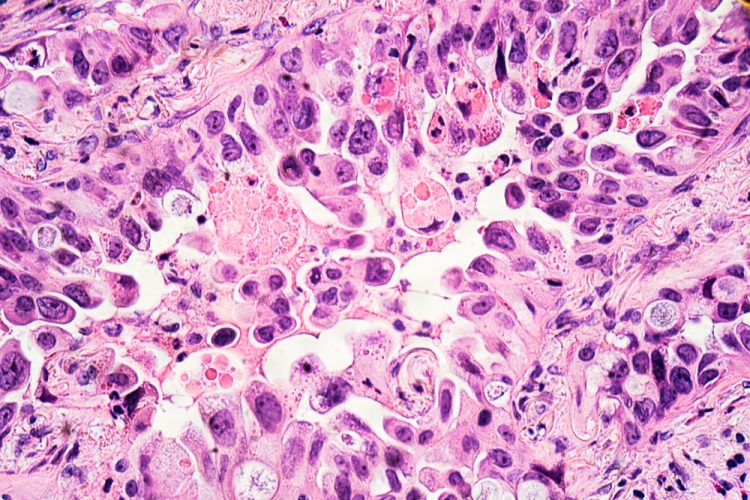FDA grants breakthrough therapy designation to Tagrisso for NSCLC
Posted: 9 October 2017 | Dr Zara Kassam (European Pharmaceutical Review) | No comments yet
The FDA has granted Breakthrough Therapy Designation for Tagrisso for the 1st-line treatment of patients with NSCLC…


AstraZeneca has announced that the US Food and Drug Administration (FDA) has granted Breakthrough Therapy Designation (BTD) for Tagrisso (osimertinib) for the 1st-line treatment of patients with metastatic epidermal growth factor receptor (EGFR) mutation-positive non-small cell lung cancer (NSCLC).
Sean Bohen, Executive Vice President, Global Medicines Development and Chief Medical Officer at AstraZeneca, said: “The Breakthrough Therapy Designation acknowledges not only Tagrisso’s potential as a 1st-line standard of care in advanced EGFR mutation-positive NSCLC but also the significant need for improved clinical outcomes in this disease. The results of the FLAURA trial have the potential to redefine clinical expectations and offer new hope for patients who currently have a poor prognosis.”
The FDA granted the BTD based on data from the Phase III FLAURA trial of Tagrisso versus standard-of-care EGFR tyrosine kinase inhibitor (TKI) therapy in previously-untreated patients with locally-advanced or metastatic EGFR mutation-positive NSCLC.
In the trial, median progression-free survival was nearly double at 18.9 months for Tagrisso compared with 10.2 months for current 1st-line EGFR TKIs (erlotinib or gefitinib). Improvements were seen in all pre-specified subgroups, including patients with and without brain metastases. Tagrisso was well tolerated with a safety profile consistent with previous experience.
On 28 September 2017, the US National Comprehensive Cancer Network Clinical Practice Guidelines in Oncology were updated to include the use of Tagrisso in the 1st-line treatment of patients with locally advanced or metastatic EGFR mutation-positive NSCLC. The use of Tagrisso for the 1st-line treatment of patients with locally advanced or metastatic EGFR mutation-positive NSCLC is not yet FDA approved.
However, Tagrisso is currently approved in more than 50 countries, including the US, EU, Japan and China, as a 2nd-line treatment for patients with advanced NSCLC who progressed following treatment with an EGFR TKI due to the EGFR T790M resistance mutation.
This is the sixth BTD that AstraZeneca has received from the FDA for an oncology medicine since 2014. BTD is designed to expedite the development and regulatory review of new medicines that are intended to treat a serious condition and that have shown encouraging early clinical results, which demonstrate substantial improvement on a clinically-significant endpoint over available medicines and when there is a significant unmet medical need.
About Tagrisso
Tagrisso (osimertinib) is a third-generation, irreversible EGFR TKI designed to inhibit both EGFR-sensitising and EGFR T790M-resistance mutations, with clinical activity against central nervous system (CNS) metastases. Tagrisso 40mg and 80mg once-daily oral tablets have been approved in more than 50 countries, including the US, EU, Japan and China, for patients with EGFR T790M mutation-positive advanced NSCLC. Tagrisso is also being investigated in the adjuvant setting and in combination with other treatments.
About FLAURA
The FLAURA trial assessed the efficacy and safety of Tagrisso 80mg once daily vs standard-of-care EGFR TKIs (either erlotinib [150mg orally, once daily] or gefitinib [250mg orally, once daily]) in previously-untreated patients with locally-advanced or metastatic EGFR-mutated NSCLC. The trial was a double-blinded, randomised study, with 556 patients across 30 countries.
The primary endpoint of the trial was progression-free survival (PFS), and secondary endpoints included overall survival (OS), objective response rate (ORR), duration of response (DOR), disease control rate (DCR), safety, and measures of health-related quality of life (HRQoL).
About NSCLC
Lung cancer is the leading cause of cancer death among both men and women, accounting for about one-quarter of all cancer deaths, more than breast, prostate and colorectal cancers combined. Approximately 10-15% of patients in the US and Europe, and 30-40% of patients in Asia have EGFR-mutated NSCLC. These patients are particularly sensitive to treatment with currently-available EGFR TKIs, which block the cell-signalling pathways that drive the growth of tumour cells. However, tumours almost always develop resistance to EGFR TKI treatment leading to disease progression. Approximately half of patients develop resistance to approved EGFR TKIs such as gefitinib and erlotinib due to the resistance mutation, EGFR T790M.
Approximately 10-15% of patients in the US and Europe, and 30-40% of patients in Asia have EGFR-mutated NSCLC. These patients are particularly sensitive to treatment with currently-available EGFR TKIs, which block the cell-signalling pathways that drive the growth of tumour cells. However, tumours almost always develop resistance to EGFR TKI treatment leading to disease progression. Approximately half of patients develop resistance to approved EGFR TKIs such as gefitinib and erlotinib due to the resistance mutation, EGFR T790M.
Tagrisso also targets this secondary mutation that leads to disease progression. There is also a need for medicines with improved CNS efficacy, since approximately 25% of patients with EGFR-mutated NSCLC have brain metastases at diagnosis, increasing to approximately 40% within two years of diagnosis.
Related topics
Big Pharma, Clinical Trials, Drug Manufacturing, Research & Development (R&D)









